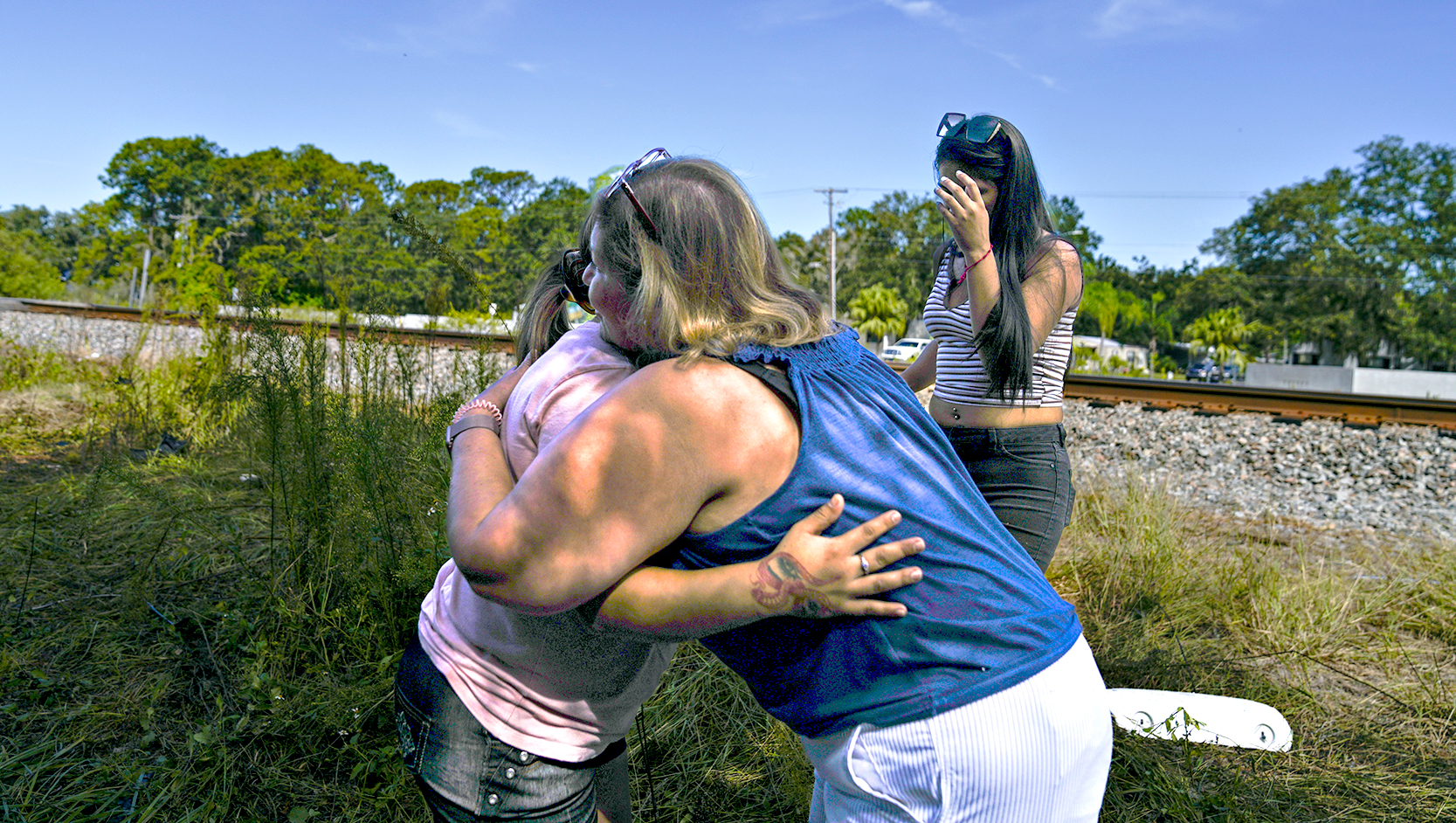Abortion could rally Dems: Economy, inflation top voters’ minds
Published 3:00 pm Wednesday, October 19, 2022

- Malia Thomas | The Valdosta Daily Times Christina Hansard, protest organizer, and Jay Rogers wanted to give people an outlet for their frustrations with the Supreme Court overturning Roe v. Wade.
Abortion access will be decided in several states in November through contested races for governorships and legislative control, ballot measures and U.S. Senate seats.
As the Nov. 8 general election approaches, many Democratic candidates are using the issue of abortion to bolster support, while Republican campaigns largely are shifting right-to-life arguments into the background.
The debate over abortion intensified in June after the U.S. Supreme Court overturned Roe v. Wade, the 1973 decision that granted abortion protections.
But even as most Americans say abortion should be legal in at least some circumstances, according to Gallup polling, other issues may take center stage in November.
David Johnson, CEO and founder of Strategic Vision PR Group in Atlanta, has Republican clients in several states. Opposition to the Supreme Court decision remains evident, he said, but the “fervor and the priority” is receding.
“We focus back to the issues that we’re seeing in our polling that really are No. 1 in voters’ minds … inflation, the economy and crime,” Johnson said.
Momentum swelled immediately behind reproductive rights advocacy following the court’s controversial ruling in Dobbs v. Jackson Women’s Health Organization on June 24.
A New York Times analysis of voter registration data in 10 states, including Oklahoma, Ohio and Pennsylvania, found that women outpaced men in new voter registrations by a combined 35% after the ruling.
But a data analysis by the progressive consulting group TargetSmart shows that nationwide the count of newly registered voters in 2022 trails 2018 and is far off the pace of 2020.
On the ballot
Voters in five states will consider abortion-related ballot measures in November.
The question in California, Michigan and Vermont is whether to amend their state constitution to establish a right to reproductive freedom.
In Kentucky, it’s the opposite: Voters will be asked to consider an amendment affirming there is no abortion right in the state.
In Montana, voters will consider an initiative to declare all infants born alive including after an abortion are legal persons and require necessary health care to preserve their lives.
There’s no ballot measure on abortion this fall in Pennsylvania, but access to the procedure could change depending on who is elected governor.
The Republican gubernatorial nominee, state Sen. Doug Mastriano, vehemently opposes abortion without exceptions. If elected, he won’t veto measures restricting access in the way that’s become a hallmark of term-limited Democratic Gov. Tom Wolf.
Democratic nominee Attorney General Josh Shapiro vows to protect abortion access and use the governor’s veto power to do so.
“There’s no doubt which issue (Shapiro) wants to ride: It’s abortion. It’s overwhelming. There’s nothing even close,” said Chris Borick, political science professor and director of the Muhlenberg College Institute of Public Opinion in Pennsylvania.
Republicans hold majorities in Pennsylvania’s state House and Senate. But legislative redistricting has opened the door for a potential shift from red to blue in the House, a scenario that could protect abortion access.
Pennsylvania’s U.S. Senate race pits Democrat John Fetterman against Republican Dr. Mehmet Oz. Fetterman, who supports abortion rights, continues to hammer at Oz on the topic. Oz is an anti-abortion candidate who has expressed support in the past for women’s right to choose.
The outcome of that race could swing majority control of the upper chamber in Congress, where Republican Sen. Lindsey Graham of South Carolina recently proposed a national abortion ban at 15 weeks.
Post-Dobbs bans
At least 14 states began enforcing abortion bans post-Dobbs, according to the abortion research group Guttmacher Institute. Additional bans are currently being contested in courts in eight other states.
Indiana’s near-total abortion ban is among those on hold following a court challenge filed in late September. When the ban temporarily took effect on Sept. 15, Democratic legislators called on voters to express their opposition at the ballot box.
About 5% more women than men either registered to vote or updated their voter information from January through the first half of September, according to data from the Indiana Secretary of State’s Office.
The data doesn’t reflect party affiliation. But the TargetSmart analysis found that post-Dobbs, 4,878 Republican women registered to vote in Indiana compared to 2,951 Democrats.
“It’s important in theory, but maybe it’s not the most important thing,” Brandon Crawford, assistant professor of applied health science at Indiana University, said of abortion motivating voters. “So, it may not be driving people to vote.”
Georgia’s abortion ban could play a role in the Nov. 8 election, where the governor’s seat will be decided. Democrats there generally have placed abortion among their central talking points, while Republicans have given the topic a backseat.
Democratic state Rep. Jasmine Clark said abortion has become so political that behind the scenes, some Republicans have expressed concerns about restricting access.
“Despite efforts to include Republicans in our conversation about protecting women’s rights, they face consequences if they were to stand with us,” Clark said. “And that’s just the political truth in an election year: It’s very difficult for many Republicans to stand alongside people of Georgia, stand with the majority of Georgians, the majority of the country and say, ‘This is too much. This is extreme. We cannot do this.’”
In conservative Missouri, the Democratic candidate for the state’s biggest race is campaigning heavily on abortion rights, while the Republican candidate has centered his campaign largely on the economy and other issues.
Trudy Busch Valentine, the Democratic nominee for U.S. Senate and a retired nurse, labels herself pro-choice. If elected, she pledges to codify protections into federal law. She recently released an ad attacking her Republican opponent, Eric Schmitt, labeling his views on abortion “un-American.”
Schmitt, the state’s current attorney general, made Missouri the first in the nation post-Dobbs to enact its so-called trigger ban, which prohibits abortion in most cases. A campaign statement at the time credited his “pro-life conviction,” but his campaign since then has focused more on issues such as jobs, inflation and border security.
In Oklahoma, also a deeply red state, a late September poll of 500 likely voters conducted by Amber Integrated found that abortion ranked a distant third in terms of the issues most influencing Oklahomans’ selection for governor. Of those polled, 32% said the economy and inflation were the biggest influences, followed by 27% who cited education. Only 16% said abortion was their biggest concern.
Oklahoma Republican Gov. Kevin Stitt faces Democrat Joy Hofmeister in the state’s gubernatorial election.
Stitt said “people are dug in on their opinions” about abortion.
“Will people come out to vote on that single issue?” he asked. “Yeah, maybe, absolutely. I don’t think it’s going to swing (the outcome) one way or the other.”
‘Best strategy’
All abortions are currently illegal in Texas.
Beto O’Rourke, seeking the governor’s office, and other statewide Democratic candidates are leaning into the ban as a campaign issue. Gov. Greg Abbott and conservatives are steering clear of the conversation as much as possible, turning the focus to border security and the economy.
Democrats and political analysts say keeping abortion front of mind is the “best strategy” for Dems to beat the GOP, although it may not translate into actual votes, according to Daron Shaw, a political science professor at the University of Texas at Austin.
“In Texas, the default Republican advantage right now is between five and 10 points for statewide races. Is Dobbs enough to overturn what would probably be an eight- to 10-point added win? I am really dubious about that,” Shaw said.
A September Texas Politics Project poll found the majority of Texans — 60% — are in favor of at least some abortion access.
The election season in New York, where abortion is codified into state law, has evolved into a push by Democrats to convince independent and moderate voters that abortion rights is a crucial issue.
Republicans, alternatively, hope those same voters will embrace their theme that public safety and the state’s economy are the matters that warrant their attention.
A Siena College poll released Sept. 28 found likely New York voters oppose the Dobbs decision 67% to 27%. The same survey indicated that even a higher percentage, 72%, say abortion should be always or mostly legal.
But the survey also indicated that voters across the spectrum view economic matters as the state’s top issue, with abortion well down the list of concerns.
Massachusetts’ law and rulings on the state constitution by its Supreme Court protect abortion access.
However, the wide-open race for governor finds abortion as a central issue.





